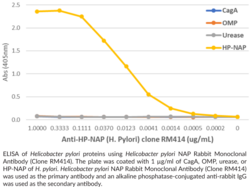Territorial Availability: Available through Bertin Technologies only in France
- Correlated keywords
- RM 414 HPNAP ?helices TLR 2 HEK 293
- Product Overview:
Helicobacter pylori (H. pylori) is a Gram-negative bacterium that can infect and colonize the stomach, leading to chronic gastritis, stomach inflammation and oxidative stress, peptic ulcer disease, and gastric cancer.{54750} H. pylori neutrophil-activating protein (HP-NAP) is a virulence factor and member of the DNA-protecting proteins from starved cells (Dps) family.{54751} It is composed of 12 identical monomers each containing four ?-helices.{54752} It activates neutrophils and increases their infiltration into the gastric mucosa by increasing the production of reactive oxygen species (ROS), secretion of myeloperoxidase (MPO), and release of cytokines from a variety of host immune cells.{54751} HP-NAP protects H. pylori from bacterial DNA damage induced by this oxidative stress. It also induces a cytotoxic Th1 response in T cells in vitro and is a toll-like receptor 2 (TLR2) agonist that activates NF-?B in HEK293 cells.{54753} HP-NAP is an iron-binding protein, and H. pylori strains isolated from patients with iron-deficiency anemia have a SNP in napA, the gene encoding HP-NAP, and an increase in iron uptake compared with strains not containing the SNP.{54752,54754} HP-NAP is immunogenic in humans, and oral recombinant HP-NAP administration is protective against H. pylori infection in mice.{54755} Cayman’s Helicobacter pylori NAP Rabbit Monoclonal Antibody (Clone RM414) can be used for ELISA.
Cayman Chemical’s mission is to help make research possible by supplying scientists worldwide with the basic research tools necessary for advancing human and animal health. Our utmost commitment to healthcare researchers is to offer the highest quality products with an affordable pricing policy.
Our scientists are experts in the synthesis, purification, and characterization of biochemicals ranging from small drug-like heterocycles to complex biolipids, fatty acids, and many others. We are also highly skilled in all aspects of assay and antibody development, protein expression, crystallization, and structure determination.
Over the past thirty years, Cayman developed a deep knowledge base in lipid biochemistry, including research involving the arachidonic acid cascade, inositol phosphates, and cannabinoids. This knowledge enabled the production of reagents of exceptional quality for cancer, oxidative injury, epigenetics, neuroscience, inflammation, metabolism, and many additional lines of research.
Our organic and analytical chemists specialize in the rapid development of manufacturing processes and analytical methods to carry out clinical and commercial GMP-API production. Pre-clinical drug discovery efforts are currently underway in the areas of bone restoration and repair, muscular dystrophy, oncology, and inflammation. A separate group of Ph.D.-level scientists are dedicated to offering Hit-to-Lead Discovery and Profiling Services for epigenetic targets. Our knowledgeable chemists can be contracted to perform complete sample analysis for analytes measured by the majority of our assays. We also offer a wide range of analytical services using LC-MS/MS, HPLC, GC, and many other techniques.
Accreditations
ISO/IEC 17025:2005
ISO Guide 34:2009
Cayman is a leader in the field of emerging drugs of abuse, providing high-purity Schedule I-V Controlled Substances to federally-licensed laboratories and qualified academic research institutions for forensic analyses. We are certified by ACLASS Accreditation Services with dual accreditation to ISO/IEC 17025:2005 and ISO Guide 34:2009.





